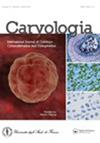Genetic variations and interspesific relationships in Lonicera L. (Caprifoliaceae), using SCoT molecular markers
IF 2.1
4区 生物学
Q2 Agricultural and Biological Sciences
引用次数: 0
Abstract
Lonicera L. (Caprifoliaceae) includes more than 200 species worldwide. The genus is mainly distributed in temperate to subtropical regions of the northern hemisphere: Europe, Russia, East Asia and North America. Some species are medicinal plants. Dried Lonicera flowers and buds are known as Flos Lonicera and have been a recognized herb in the traditional Chinese medicine for more than 1500 years. It has been applied for treatment of arthritis, diabetes mellitus, fever, and viral infections. Due to the importance of these plant species, we performed a combination of morphological and molecular data for this species. For this study, we used 85 randomly collected plants from six species in 6 provinces. Amplification of genomic DNA using 10 primers produced 103 bands, of which 95 were polymorphic (90.98%). The obtained high average PIC and MI values revealed high capacity of SCoT primers to detect polymorphic loci among Lonicera species. The genetic similarities of 6 collections were estimated from 0.67 to 0.90. According to the SCoT markers analysis, L. hypoleuca and L. iberica had the lowest similarity and the species of L. korolkowii and L. nummulariifolia had the highest similarity. The aims of present study are: 1) can SCoT markers identify Lonicera species, 2) what is the genetic structure of these taxa in Iran, and 3) to investigate the species inter-relationship? The present study revealed that SCoT markers can identify the species.利用SCoT分子标记分析忍冬属植物的遗传变异及种间关系
忍冬属植物(忍冬科)在世界上有200多种。该属主要分布于北半球的温带至亚热带地区:欧洲、俄罗斯、东亚和北美。有些品种是药用植物。干燥的忍冬花和花蕾被称为忍冬花,在1500多年的传统中医中被公认为是一种草药。它已被用于治疗关节炎、糖尿病、发烧和病毒感染。由于这些植物物种的重要性,我们对该物种进行了形态学和分子数据的结合。在本研究中,我们随机采集了来自6个省6个物种的85株植物。10条引物扩增出103条条带,其中95条为多态性,占90.98%。较高的平均PIC和MI值表明,SCoT引物具有较高的检测忍冬属植物多态位点的能力。6个群体的遗传相似度在0.67 ~ 0.90之间。SCoT标记分析结果显示,低绿乳杆菌和伊比利亚乳杆菌的相似性最低,科罗科乳杆菌和nummulariifolia的相似性最高。本研究的目的是:1)SCoT标记能否识别忍冬属植物,2)伊朗忍冬属植物的遗传结构是什么,3)探讨忍冬属植物间的相互关系。本研究表明,SCoT标记可以识别物种。
本文章由计算机程序翻译,如有差异,请以英文原文为准。
求助全文
约1分钟内获得全文
求助全文
来源期刊

Caryologia
生物-遗传学
CiteScore
1.60
自引率
23.80%
发文量
26
审稿时长
12 months
期刊介绍:
Caryologia is devoted to the publication of original papers, and occasionally of reviews, about plant, animal and human karyological, cytological, cytogenetic, embryological and ultrastructural studies. Articles about the structure, the organization and the biological events relating to DNA and chromatin organization in eukaryotic cells are considered. Caryologia has a strong tradition in plant and animal cytosystematics and in cytotoxicology. Bioinformatics articles may be considered, but only if they have an emphasis on the relationship between the nucleus and cytoplasm and/or the structural organization of the eukaryotic cell.
 求助内容:
求助内容: 应助结果提醒方式:
应助结果提醒方式:


